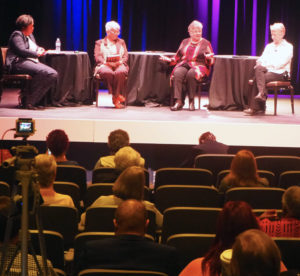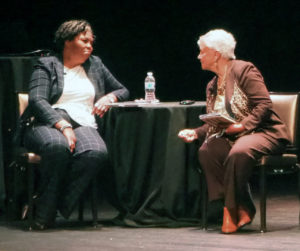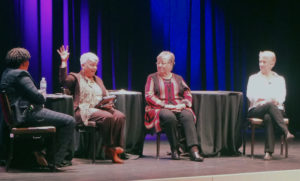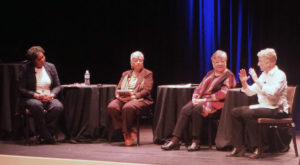Historic Panel of Women Social Justice Leaders Brings Message of Hope, Resilience, and Faith to CHHSM Annual Gathering

The Rev. Linda Jaramillo describes her childhood experiences. From left: the Rev. Traci Blackmon, the Rev. Dr. Bernice Powell Jackson, Jaramillo, and the Rev. Loey Powell.
Hope, grace, and justice. These three words wound throughout an historic panel discussion by four UCC women leaders in justice advocacy March 4 at the Council for Health and Human Service Ministries’ Annual Gathering in Memphis.
Moderated by the Rev. Traci Blackmon, the UCC’s Associate General Minister of Justice & Local Church Ministries and senior pastor of Christ the King UCC in Florissant, Mo., the panel included the Rev. Dr. Bernice Powell Jackson, founding executive minister of Justice and Witness Ministries and currently the pastor of First United Church of Tampa (Fla.); the Rev. M. Linda Jaramillo, former executive minister of Justice and Witness Ministries; and the Rev. Loey Powell, former executive director of the UCC’s Coordinating Center for Women.
Sandy Sorensen, director of the Washington, D.C., office of Justice and Witness Ministries, introduced the panel in unconventional fashion, a portent of the discussion to come. “On this stage are pastors, activists, community organizers, international feminists, womanists, mujerista leaders, writers, theologians, mothers, mentors, companeras, seed planters, bridge builders, risk takers, light bearers, justice and witness together,” Sorensen told the audience, “women whose ministries are firmly and always have been planted at the intersections of oppressions.”
The discussion focused on the factors that shaped each of the women and their paths to becoming justice leaders. Blackmon, in beginning the discussion, cited the exemplary leadership modeled by the panelists, and said, “I am especially honored to serve as the moderator today because these are my predecessors in the national setting. I call them my aunties. They’re also my role models, and reminders that the work and the call never ends.”
Growing up Latinx in Colorado
All three panelists focused on their formative youth and young adult years, the influence of their mothers and other women mentors. Jaramillo, raised by parents who were community activists, recounted growing up in a segregated society and classroom in southern Colorado. Her mother “insisted we be part of the whole school,” she said. Although she had grown up speaking Spanish, her mother made sure she could speak English before she enrolled in school. Still, Jaramillo dealt “with abuse of kids who looked like me, with the fact that we weren’t allowed to speak Spanish in school,” and other forms of racist behavior from teachers and classmates.
Later, after marrying and changing her name to Clark, Jaramillo said she realized that the name “created a different sense of privilege for me. And because I’m light complexioned, I got into places that I had not ever realized I could get into. That was a stunning realization of how assimilation works.”
Jaramillo found that she had “a hole in my soul.” She added, “I was in places where racial ethnic jokes were told, and I was that joke.”
She found her path at a UCC congregation in Oregon that was providing migrant child care to babies and children 6 months to 6 years old. “They’d convert the whole building to a day care center during the summer to take care of kids so they wouldn’t go into the fields and be exposed to the toxins and the extreme heat,” she said. “Wow! This is a church I wanted to think about!”
A second-career call to seminary some 30 years later helped her come full circle. Jaramillo listed her four life values: encuentro (connecting with each other in deeper, stronger spiritual ways), solidaridad (solidarity to support not assume or assimilate); the belief that justice is theological, not political; and hope. “I have traded my sense of optimism with hope, because I believe hope is what makes it possible,” she said. “That’s where I find my sense of Jesus in my life: the resurrection and the hope that is brought to us. Because when you do this, work, you really get discouraged from time to time.”
A Brown vs. Board of Education Baby in D.C.

The Rev. Traci Blackmon and the Rev. Dr. Bernice Powell Jackson.
Powell Jackson found that CHHSM’s visit to the National Civil Rights Museum in the Lorraine Motel, site of the assassination of the Rev. Dr. Martin Luther King Jr., earlier in the week caused her to reshape her planned presentation. A “Brown vs. Board of Education baby,” Powell Jackson entered kindergarten in Washington, D.C., in 1954, when the first two school systems — in D.C. and Baltimore — were integrated. On the first day, “the teacher called our names, and we lined up and the little child in front of me turned around and said, ‘Are you white or are you a Negro?’”
Not knowing the answer to that question — “I knew who I was the daughter of and the sister of,” she said — Powell Jackson asked her mother later that day. “And my mother had to explain.”
Powell Jackson also emphasized her mother’s influence. Because she was raised without opportunities for advanced education as a young girl, Powell Jackson’s mother “instilled in me the importance of education, because it had been denied to her.”
During her talk, Powell Jackson also cited her father’s death when she was 7. A State Department employee who had been a captain in the U.S. Army in World War II, he died of a heart attack.
“But he died of being a black man in America,” Powell Jackson candidly told the audience. “And that’s still the case. There are still people dying from racism: the stress; dying from inadequate health care; from being shot. All of this is part of the reality I have seen in my lifetime. It’s not a museum. It’s life — and it’s shaped who I am.”
Seminary Became a Rebirth
Loey Powell, raised in Chicago, also recounted her parents’ focus on education, both of whom were “justice people in the core of their beings.” Taking after her mother, Powell said, “As a child, I did not behave. I got sent down to the principal’s office a lot. My father would have to come bail me out because my mother felt hypocritical because she, too, got in trouble a lot when she was in school!”
An exchange with a principal over whether or not to write lines as punishment for talking in class proved to be a catalyst for her path to justice advocacy. Powell won the argument. “What I learned from that is there are norms, there are rules, there are traditions,” Powell said. “There are all sorts of things that need to be challenged from time to time. They just don’t make sense. They’re not necessarily in the best interest of all of us. I learned to question authority.”
College in the 1960s and 1970s was all about protests. “The justice stuff was all around us,” said Powell. “So I learned to be an activist. I learned to take part in things, to protest.” Powell headed to UCC-related Pacific School of Religion in Berkeley, Calif. — but, as she described it, troubled in her soul.
“It was when I went to seminary and fell in love with a woman that I realized who I was and came out,” she said. “My parents’ biggest worry was that I might not get a job if I was going into ministry — they were realists. But spiritually for me, I turned from being a Maundy Thursday person into an Easter person. I knew what new life was for the first time. I knew what resurrection was. I knew it was possible … coming into myself and knowing that that’s possible for every one of God’s children helped so much.”
Shortly after seminary, during the beginnings of the AIDS epidemic, Powell learned a new aspect of advocacy. “Young men and women were dying, and trans women were dying, and nobody was doing anything for them,” Powell said, “except for the women, who began care organizations. And most of us were lesbians.” Powell also became involved in the movement to create awareness of violence against women. “If it weren’t for the women, and the lesbian women, there wouldn’t be shelters for women, and safe houses. We were often the ones who navigated those waters and created safe space. So I learned that. And it became part of my DNA.”
Audience Responds to Stories
The life stories of the panelists had a significant impact on their audience. “Particularly as a young woman and young clergyperson, the profound witness of the panelists cannot be overstated,” said the Rev. Elyse Berry, CHHSM’s associate for advocacy and leadership development. “Seeing what is possible for so many of us who continue to be told we shouldn’t have a seat at the table, a voice from the pulpit, or a name on a ballot or marriage license helps us to imagine and claim ourselves as God’s beloved.”
The Rev. Dr. Monica Dawkins-Smith, interim pastor of First United Church in Bloomington, Ind., knew the panel discussion would be meaningful. “I’ve come to expect CHHSM to lead the way with matters related to justice, care, and compassion so, of course, it didn’t surprise me that this intentional all-women event would happen at a regular UCC event,” Dawkins-Smith said.
The panel discussion was “very important for me as a woman of color and as a member of the CHHSM Board of Directors,” she added. “This was brilliant and timely, as it echoed the ongoing struggles of women of color — and all women — in the current U.S. political, social and religious settings. The conversations also echoed the justice and grace of God’s redemptive message spoken by the women who were the first eyewitnesses to the resurrection!”
“What I appreciated most is that CHHSM highlighted the sacred stories of women,” said Stephanie Franklin, senior vice president of UCAN in Chicago. “The women who speak up and out, who disrupt, who challenge, who nurture, who listen, who hold each other up, who say it’s not OK.”
Mentors Known and Unknown

The Rev. Dr. Bernice Powell Jackson makes a point during the panel discussion.
All three panelists named women who served as mentors in their justice advocacy formation. Blackmon began by describing the Rev. Dr. Yvonne Delk, former UCC Office for Church in Society (OCIS) executive director, who had to bow out of the panel after the death of a member of her congregation. Blackmon related that years earlier, Delk had taken Blackmon to a church in Atlanta. The church had given Delk a job in the basement; she later unexpectedly landed in the pulpit, filling in for a guest speaker. “The reason I’m telling you this story,” Delk told Blackmon, “is because your job is to be ready when the call comes.”
“I met so many extraordinary women,” Powell Jackson told the audience, “like Juanita Helphrey. She told sacred stories about what it meant to be a Native American woman growing up on the Fort Berthold reservation. Her stories became my stories. And when I met Linda, she told me sacred stories of growing up and those stories became my stories.”
Powell Jackson also referenced Toyo Nakamura, a Japanese-American woman from Hawai’i who stood up on behalf of Korean comfort women (Korean women who were sexually assaulted and abused by Japanese soldiers during World War II). “She told me that story. That was a sacred story. And that story changed me,” Powell Jackson said. “All of these stories that I learned … became my story. And it changed me. I was no longer the person who was the daughter of Bernice and Otis Fletcher. I was the daughter of all these people and all these communities.”
“And that to me has been such a gift from the UCC,” Powell Jackson added. “A gift that we should not take for granted.”
Powell Jackson also expressed appreciation for the CHHSM Annual Gathering theme, “Justice and Grace — Together.” “When I started out, I was really all about racial justice in America, and I didn’t see much grace,” she admitted to the audience. “So to put justice and grace together is a good thing. As I’ve grown older, I understand we can’t really have justice without grace.”
Jaramillo named mothers and mother figures, especially the farm worker women who had served as mentors to her. These often unnamed women are “those people in the morning who build their babies up: wake them up, build them up, especially children of color or LGBTQ people. And they build them up to know that they are valued, a child of God.”
She referenced the current situation of families being separated at the border. “Systematically, we have separated those families — who is telling those babies in those cages that they’re worth it? Who is telling those babies they’re beautiful? Who is telling those babies that they are a child of God? How can we sit back and allow that to happen again and again and again?”
Jaramillo cited the women “who are probably tragically crying themselves to sleep every day. Not only do they not know where their children are, they can’t tell them how beautiful they are. Those are the women I hold up in the sense of loss because they continue to be courageous.”
Powell recognized another former OCIS director, the late Valerie Russell, and also highlighted “all the unknown women.” She talked about her grandmother — “one of those unknown women. She was a nurse in New York City in the 1920s and 1930s, and in the teens. She distributed birth control,” Powell said. “She had a birth control clinic in her home for women. She was fitting women with diaphragms when it was totally illegal to do so … she just put herself out there.”
“There are women around the world who do similar things,” Powell added. “Why don’t we get the acknowledgment? It’s because of patriarchy. It’s because of misogyny. It’s because of sexism. It’s because of those who make the rules and want to give us the narrative of how we’re supposed to live. But we are creating our own narratives. We are defining who we are.”
Concluding Thoughts Going Forward

The Rev. Loey Powell describes her advocacy roots.
The panel discussion took place during the first plenary session of CHHSM’s Annual Gathering. Comprised of women leaders, the panel also had a positive impact on the men in the audience.
“It was all about the stories,” said the Rev. Bruce Roller, executive director of United Church Outreach Ministry in Wyoming, Mich. “These women who have been my heroes sat before us and told the impact that other women’s stories and actions had had on their lives. I heard why they were compelled to be great leaders because of the impact of other women’s stories on them — how their stories were shaped by the stories of others.”
UCAN’s Franklin said she appreciated the way the women modeled compassion in leadership. “What was most meaningful to me was to see so much genuine love and respect on that stage,” she said. “Fierce compassion, not competition. We need more of that — unity so we are ready when the call comes.”
Like Roller, the Rev. Cindy Bumb, chaplain at UCC-related Emmaus Homes in St. Louis, was most moved by the stories. “What I remember most from the women’s panel are the sacred stories,” she said. “Here were powerful, accomplished women, sharing their personal experiences of injustice encountered at early ages. Racism, sexism, classism, homophobia. But they also talked about the women who were there for them, helping them overcome and persist, inspiring them to achieve. It reminded me that so often, the good news of our faith is embodied and proclaimed through our own life stories.”
For the Rev. Alice Graham, executive director of UCC-related Back Bay Mission in Biloxi, Miss., the panel discussion was the highlight of the entire Annual Gathering. “The most inspiring part of the conference was hearing the panel of women,” Graham said. “As I listened to their reflections on their journeys and heard their stories, I was able to affirm my own journey. It was comforting and encouraging to hear these women’s empowered experiences when they claimed agency in their own lives.”
Blackmon concluded the panel by sharing her reflections with the audience, and focused on each panelist’s “commitment to the full visualization of all women.”
“Recognizing that, yes, we’re on this stage because it’s easy to do the categories, but that all women make a difference,” Blackmon said. “And not only am I saying that because there are women in this room, but to dispel the myth that there’s actually some front line that you get to go to.
“There is no front line. There’s only a decision to show up fully as you are. And if you show up, opportunities to serve will be all around you. That’s what I learned from them … we are stronger because women get that we are better together than we are apart.”
The Rev. Dr. Yvonne Delk, for director of the UCC’s Office for Church in Society, was scheduled to appear, but could not due to the death in her congregation. She sent these reflections to complement the panel discussion.
Join Our Mailing LIst
"*" indicates required fields
Follow on Facebook
Caring for Caregivers: United Church Homes 'Walks the Talk' for Employees - CHHSM
www.chhsm.org
United Church Homes (UCH), based in Marion, Ohio, is extending its reputation as a caregiver-friendly employer by reinforcing its commitment to supporting employees who balance their professional resp...